"I don’t know how to tell you but Nastia and her children are no longer with us." A story of life and death of a family from an occupied village in Zaporizhzhia Oblast
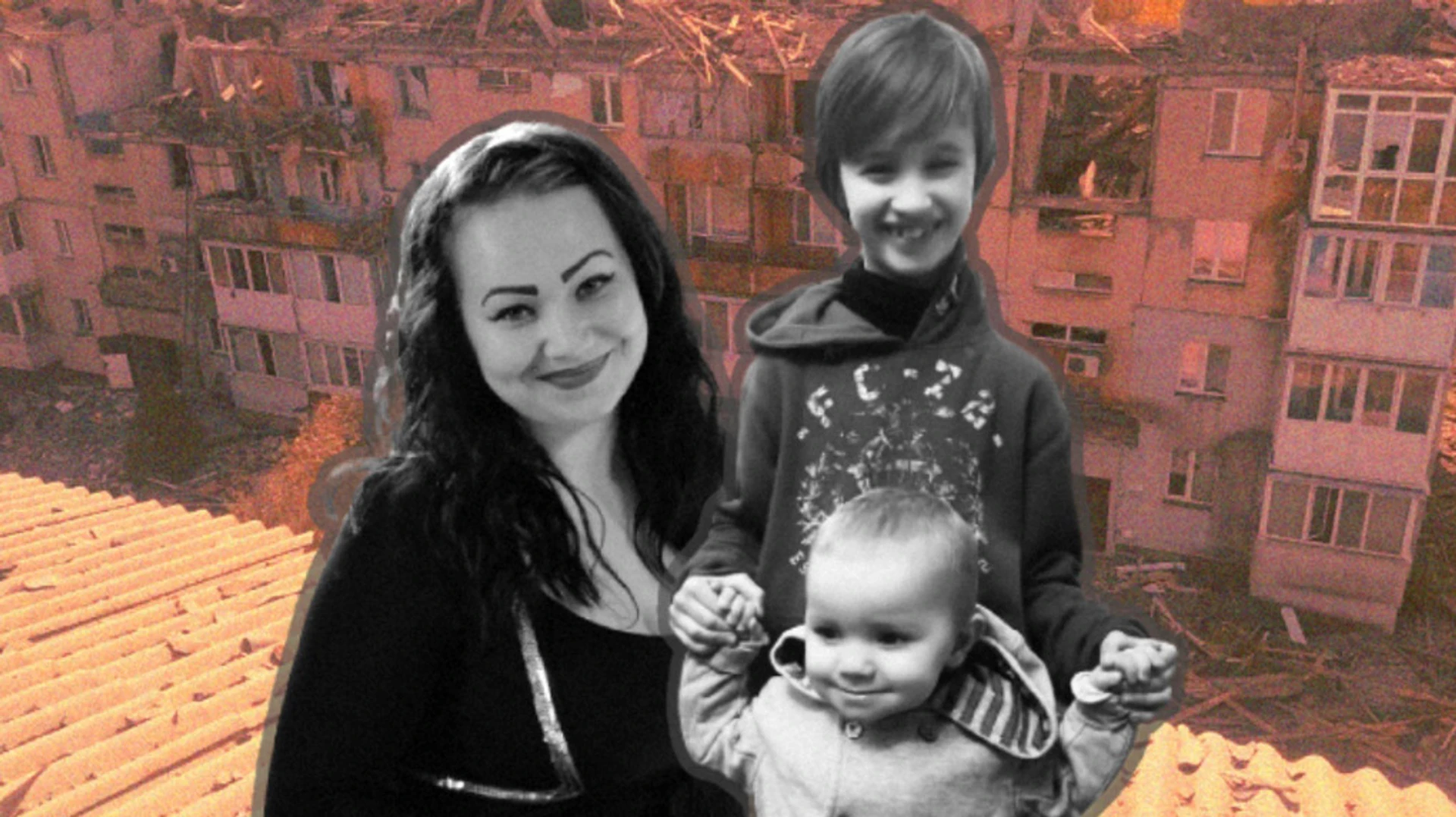
Yeseniia Shestakova was in Spain on 26 August 2022. A friend called her at approximately 15:00: "I don’t know how to tell you this, but they say Nastia and her children are no longer with us." Nastia was 29-year-old Anastasiia Borovyk from Kamianka in Zaporizhzhia Oblast. In spite of her friend, and godmother to her child, Yeseniia’s pleas for her to leave the Russian-occupied village, she stayed.
There was a Russian checkpoint established near the house where Nastia lived. According to Yeseniia, the occupiers then deserted it on 26 August. And that was when Russian munitions hit the four-storey residential building. Nastia and her two young sons, who lived there, were killed. People in the village say that everyone knows that the Russians were the ones who struck the building.
Nevertheless, the occupiers made a video at the site which they had disseminated in order to discredit the Armed Forces of Ukraine. In the video, they made false claims about the Ukrainian army destroying houses and killing civilians.
***
Yeseniia Shestakova, 39, was born and spent most of her life in Kamianka. When the occupiers blew up a local petrol station in front of her eyes, she decided to evacuate. Her parents joined her later, after the Russian soldiers came to their home on 24 March, looked in every corner and took everything they wanted. Yeseniia tried to convince her best friend Anastasiia Borovyk, whose son she is godmother to, to leave Kamianka as well, but she refused, saying: "No, I’ll be here with my husband."
Now Yeseniia believes that the Borovyk family did not evacuate because of Nastia’s husband’s father being bedridden. Nastia and her husband’s sister took turns looking after the old man, feeding, washing and changing him. Nastia also did not want to leave her parents in the occupied village.
[BANNER1]At the moment, Anastasiia’s family is still in Kamianka. Yeseniia is keeping in touch with them after the tragedy, trying to comfort them and saying that their pain is still very intense.
"They are all still under occupation. They completed the 40-day memorial period after Nastia and her children’s death, and remain where their graves are," Yeseniia said.
"Her soprano was enchanting"
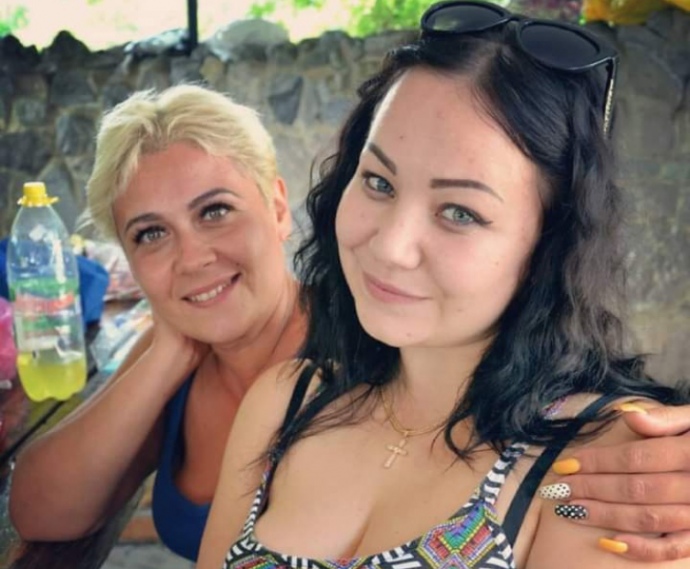
Yeseniia and Anastasiia became friends in 2019 when they started working together in a local community arts centre.
"I just came to a new team at the time, and Nastia was already working there. We reminisced a lot about our childhoods, who lived where, our mutual acquaintances, friends; this is how we got close. Nastia is kind, cheerful and sociable. We supported each other a lot. She gave me priceless pieces of advice. She helped not only me, but other colleagues, too," Yeseniia recollected.
Anastasiia Borovyk was born in the family of Olena and Oleksandr Zherikhov. Her mother has a real talent for singing; although she did not manage to realise it, as she has had to work hard since she was a child. Up until 24 February 2022, Olena Zherikhova was working as a cleaning lady in a local branch of PrivatBank.
Anastasiia’s father Oleksandr is a jack-of-all-trades; he has worked as a handyman almost all his life. He has taken any job just so his daughter could pursue her dream of singing.
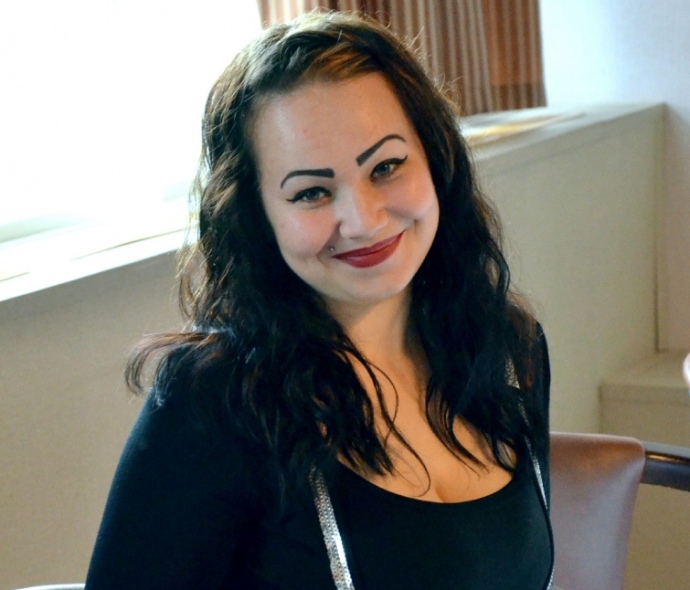
Anastasiia had attended the local community arts centre since she was a little girl. Now, it is called the Municipal Institution Centre for Culture and Leisure of Kamianka Village Council. She started working here in 2014, and was in charge of cultural programmes. She graduated from Berdiansk State Pedagogical University in 2019, and majored in musical art.
"Anastasiia Oleksandrivna, Nastiona, Anasteishn - this is how she was called in our team. She had good organisational skills. She challenged herself, worked on self-development every day. She had a good voice, gifted by God. She captivated the audience not only with her enchanting vocals or expressive diction, but with her artistry, optimism, beauty and elegance," Anastasiia’s colleagues recounted.
Another acquaintance [her name and surname are withheld at her request - ed.] recalls that Nastia was always smiling a lot. She said that in their joint creative team, they sang many primarily Ukrainian songs, particularly a capella.
"Songs were split into voice parts. Everyone had their own part. Nastia has a soprano part. When she went on the stage, the bad mood stayed backstage. Her voice was enchanting," the colleague said.
Anastasiia Borovyk often performed songs based on the world of classic poets, Ukrainian folk and patriotic songs.
Nastia also played the piano and cymbals, and wrote scripts for holiday performances: the Day of the National Flag and the Day of the Constitution. She also led a singing club for children.
Romchyk planned to go to a music school, and Mykhailyk was preparing for a kindergarten
When she was 20 years old, Anastasiia fell in love and gave birth to her son Roman Zherikhov. However, the relationship with the boy's father had not worked out, so Nastia raised Roman alone. Nevertheless, her son kept in touch with his dad, maintaining a good relationship.
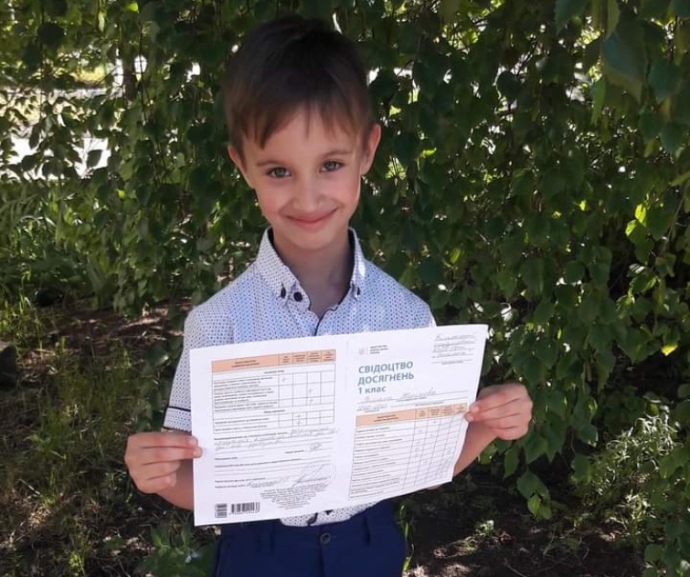
8-year-old Roman Zherikhov went to the second grade at the Kamianka specialised school, "Intellect". Anastasiia Borovyk graduated from the same school. The mother and son even had the same first teacher in primary school.
The boy did well in school, according to Yeseniia. When he went to the first grade, he already knew how to read and write.
[BANNER2]His class teacher Halyna Shulha has said that Roman was a leader by nature. He loved life a lot, wanted to be in the centre of events all the time, and had a razor-sharp mind. He liked drawing, sculpting and carving. He took all his crafts home to show them to his mum. Roman really loved her, as everyone in the school says.
"Romchyk had a lot of friends. When he missed classes for valid reasons and then came back, the children were always happy. And Roman always impatiently waited for his birthday to come. Once on his birthday, he saw teachers actively chatting on a break and decided that they were preparing to congratulate him. He smiled so sincerely then…" Halyna Shulha reminisced.
Roman Zherikhov also had musical talent. Anastasiia was planning to send him to a music school so that he could learn to play the guitar or keyboards.
"Romchyk was an obedient son," says Yeseniia. "He was such a little adult. Serious, responsible. Nastia could easily leave him for a while with his younger brother Mykhailo. Romchyk loved him very much."
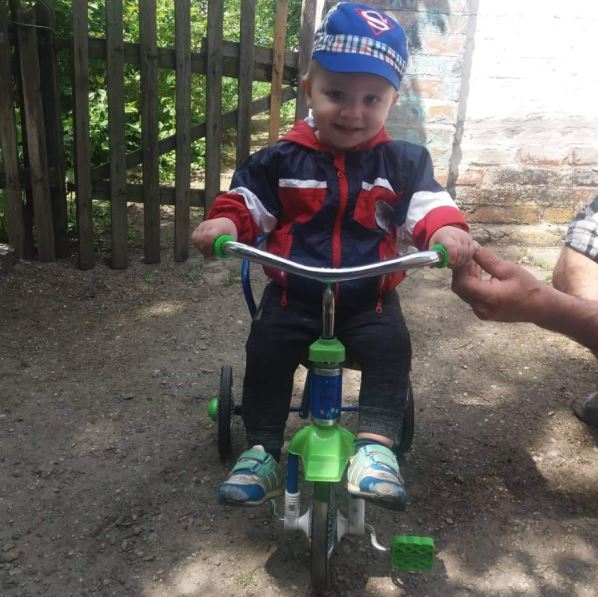
Anastasiia's youngest son Mykhailo would have turned two years old in December. This is a child from her second relationship (the father's personal information is not published for security reasons, ed.). Mykhailo was a very wanted child. Nastia's friend Yeseniia became his godmother.
"Anastasia and I often talked about her second pregnancy and marriage. We joked that we need another girl in our company. Because I also have a son. And a small hurricane was born: there it ran, something pulled there; it already scattered things. When we arrived to visit them, Mykhailo smiled a lot, held out his arms to us. He was already talking a little, humming a lot," the godmother recalls.
Anastasiia was going to send Mykhailo to nursery, but she wanted to get a job at the Kamianka music school. She dreamed of teaching young singers.
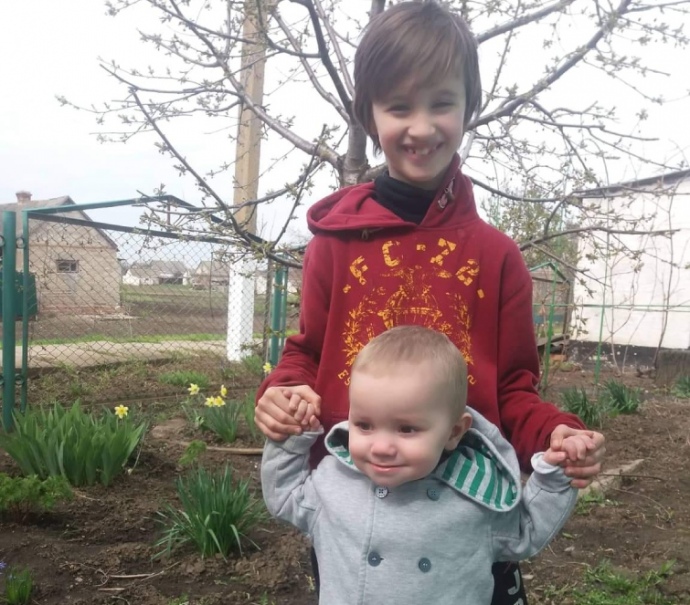
Yeseniia says that after getting married, Anastasiia became more domestic and family-oriented. Before that, the friends spent a lot of time together: walking, going to cafés, and then the family became the centre of Nastia's life.
"Her husband earned money, and she was busy with household chores and taking care of the children. Nastia cooked very delicious food! And she also made flowers from paper. She and her husband once drew a picture together, and hung it in the kitchen. They were similar to each other, both cheerful, passionate; we always joked and laughed a lot with them," says Yeseniia.
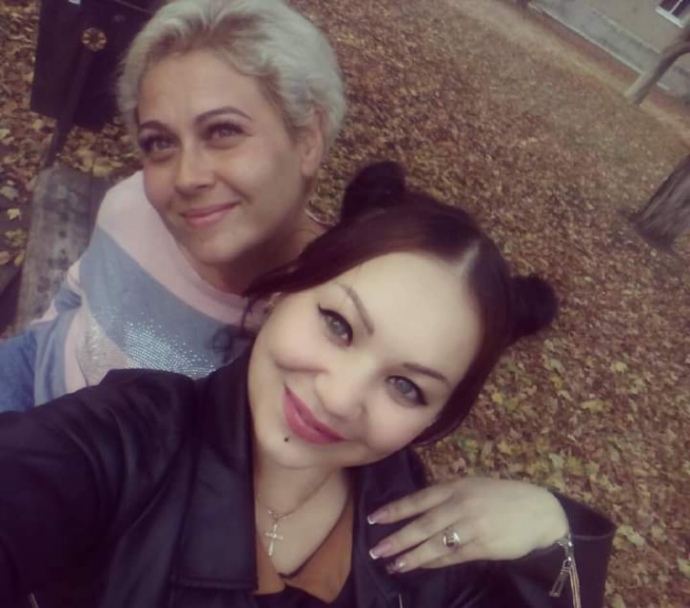
The friends enjoyed going on holiday together with their families: they went to the sea in Berdiansk; sometimes they spent time at Anastasia's husband's country house.
"Nastia and her husband were planning renovations in their apartment. I remember how they talked about the arrangement of their family nest. Nastia said: ‘here we will make a children's room, over there a living room’. This year they dreamed of a joint holiday at the sea; they would just go there with little Myshka," says Yeseniia.
The Russians were looking for partisans and Azov military in every house. Occupation of Kamianka
Anastasia Borovyk’s colleague, with whom she sang in the same band, was in occupied Kamianka for six months. The woman wished to remain anonymous. She says that she first saw Russian soldiers on the street of the village on approximately 9 March, when she went shopping in the centre of the settlement. Later, enemy tanks and armoured vehicles entered the village. Kamianka was occupied.
"When we were occupied in mid-March, schools and kindergartens closed. Some shops were damaged and looted. Russians settled on the outskirts of the village in empty houses, set up checkpoints. People began surviving. As soon as a grocery store opened, everything was swept off the shelves," recalls Anastasiia's colleague.
According to her, rotations of the Russian military took place every month, as well as inspections of apartments and verification of local residents’ documents. Soldiers checked every corner of the houses. When the owners did not open the door, Russians broke it down.
"We asked: who are you looking for? They answered that they were looking for partisans, Azov military," says a Kamianka resident. "They could make strange remarks to people. For example, an elderly man would pass by, and they would ask: ‘Where did you get the bread? You don't work, you must have stolen money."
A resident of Kamianka says that at first, in order to get money for a larger variety of food, the Russians put their army food kits on sale: canned meat, condensed milk, etc. "They put it on vendors' counters, and vendors gave them their earnings. Goods began to be sold in stores for both roubles and hryvnias," said Anastasiia Borovyk’s colleague.
In September, an illegal referendum on joining Russia was held in Kamianka. Before that, according to the woman, the occupiers made a "promotion": they issued 10,000 roubles in cash assistance for pensioners. All those who wanted were enrolled in a queue. People had to bring their passports and identification codes with them in order to apply. This is how Russians bought votes for a sham referendum. They also gave out money for newborn babies, electric furnaces, in exchange for personal data and documents. Help – in exchange for a vote.
"Also, the occupiers implemented a permit system. They made a commandant's office in the premises of the former civil registration office. There sat a commandant who issued permits for passing through checkpoints to another village or Berdiansk. In order to issue them, it was necessary to show your documents. These permits were temporary; they were constantly updated. I know that many people in Kamianka got Russian passports," says Anastasia Borovyk's colleague.
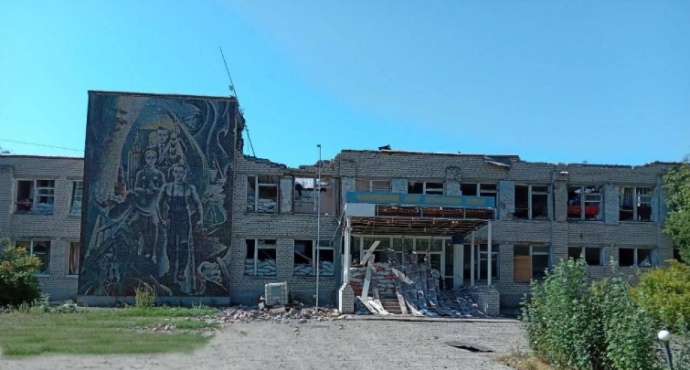
According to local residents, heavy shelling wasn’t heard in Kamianka. Shelling took place at the beginning of March, in particular in the neighbouring village of Komysh-Zoria, where the railway tracks were destroyed. After the occupation, Kamianka was quiet until August. And then the occupiers started attacking their positions themselves, according to the residents of Kamianka:
"Near one of the districts of the village, Tavriia, there was a farm where the occupiers were located. One day, Russian soldiers suddenly left, fired at the farm, and then returned. They did this to intimidate us, so that people would go to the illegal referendum. Well, they filmed a video for Russian television. First they damaged it themselves, and then journalists appeared who filmed everything and reported on their channels that the Armed Forces of Ukraine did it. They showed it under the slogans "Ukraine kills peaceful people"...
This was also the case on 26 August, when Anastasiia Borovyk and her two sons died.
"Darling, I lost them"
Yeseniia Shestakova says that many residents of Kamianka hoped that the village would be liberated within a month of the Russian invasion. But the number of Russians in Kamianka only increased with time.
People were shocked, but Yeseniia did not notice a particular sense of resistance among the locals. She called Nastia and her husband regularly after fleeing to Spain; they mostly relied on messengers to keep in touch. The Borovyks would sometimes go almost a day without replying; Yeseniia would then write to their relatives. Eventually she would always receive a long-awaited message from Nastia: "Darling, everything’s alright."
"Nastia told me that there was a Russian checkpoint right by their house. The occupiers came to their flat, checked their documents, asked why their children had different surnames. This happened every month: they would come again and again, asking the same questions. They walked around, inspected their flat. Though at least they left her and her children alone," Yeseniia says.
The last time Yeseniia reached Nastia on the phone it was the middle of August.
"Her husband picked up and pointed the phone’s camera at the apartment. I saw her wearing her home clothes. I asked her what she was doing, and she said she was canning tomatoes. I told her: ‘I’m so sick of it all, I want to go home, to see you, to hug you, to talk properly.’ She tried to cheer me up: ‘Don’t be sad, darling, we’ll see each other soon, we’ll talk and have a strong drink. Everything will be alright.’ Those words will never come true," Anastasiia Borovyk’s friend says with tears in her eyes.
Around 15:00 on 26 August, Yeseniia went on her usual walk with her son. A friend from Kamianka called her. Yeseniia heard a familiar voice say: "I don’t know how to tell you, but people are saying that Nastia and her kids are no longer with us. The building where they lived was destroyed by shelling."
Yeseniia Shestakova called Nastia’s husband’s father. He was crying. Yeseniia’s cousin sent her a photo of the building where the Borovyks lived; it was destroyed. Nastia’s husband called in the evening. Their conversation was short. He told her: "Darling, I lost them," and burst into tears.

"We were both crying. I didn’t know what to say at that moment. My heart refused to believe that they were no longer alive…Their flat was on the third floor. The fourth floor was destroyed by the attacks. Concrete slabs crushed their flat. Roma was found first, on the day of the attack. He was draped over the handrail in the stairwell; the blast flung him into the hallway," Yeseniia says, crying.
Yeseniia couldn’t talk to anyone on 27 August. That day she found out that Nastia’s body was found. Mykhailyk’s body was found two days later. Their bodies were taken to a morgue in Melitopol; they were then brought back, this time in coffins.
The residents of Kamianka say that on 26 August, the checkpoint near Nastia’s house stood empty. There was no one in the lyceum where Russian forces held those who attempted deserting. That day, the Russians carried out six attacks from the occupied village of Blahovishchenske (Vilniansk district). Their shells hit residential buildings. Two other civilians besides Nastia and her children were killed.
"Everyone knows that the Russians were the ones who carried out the shelling. When Nastia’s building was destroyed, people with a camera came to capture the destruction. Russian TV channels then reported that the Ukrainian Armed Forces carried out the attack, claiming that Ukrainian soldiers are destroying homes and killing civilians. The Russians did it to frame our soldiers," Anastasiia’s friend, who asked to remain anonymous, says.
[BANNER5]The sun was glaring in the sky in late August, when Nastia and her two sons were buried. The three coffins were drowning in flowers at the Kamianka Cemetery. Nastia’s mum, puffy with tears, stood with her head bent over them. She was gently stroking the largest coffin, her daughter’s, and whispering quietly. Nastia’s father and husband stood nearby.
Photo: Funeral of Anastasiia Borovyk and her two sons Roman and Mykhailo, family’s archive
Yeseniia sees Nastia’s features in the face of every woman who even remotely resembles her. She says that she hasn’t dreamt of Nastia once, which makes it harder.
Mobile service in the Russian-occupied Kamianka is very poor, but Yeseniia regularly writes to Nastia’s husband to support him. His messages are full of love and longing for his wife and children.
"He says that it’s very difficult for him, that he can’t live without them, that he often comes to the cemetery and talks to them," Yeseniia says. Anastasiia Borovyk's husband finds some solace in his work, which distracts him a little.
"She wanted to create, to sing and to live"
Fighting is still underway on the Zaporizhzhia front. Anastasiia Borovyk's colleague says that Kamianka’s residents are staying put because they are worried about their homes. They are afraid that if they leave now, they will have nowhere to return later. Besides, it costs a fortune to get to Zaporizhzhia, and many of the villagers either have no source of income or receive only partial wages. Some have elderly or sick relatives who need help.
"Many villagers support Russia. A boarding school with a Russian curriculum opened recently. I know that the Russians took copies of all of the teachers’ documents from the accountant’s office…" Anastasiia Borovyk’s friend says.
The residents of Kamianka who support Ukraine are eagerly awaiting the arrival of the Ukrainian Armed Forces. They keep silent because they fear for their lives. Several villagers have been kidnapped or detained. Some were later freed; others have not yet come back.
Yeseniia Shestakova says that there is only one thing she wants most of all: for her village to be liberated and for Ukraine to win the war, "so that all of those bastards disappear off the face of the earth. I will remember my darling friend and her kids for the rest of my life. I miss them so much and I will love them forever."
The talented singer is missed by her students and her colleagues, who say: "Who will take prizes at singing competitions now?"
"I think Nastia would have liked to perform for large audiences. She wanted to create, to sing and to live," Yeseniia says.
In the evenings, Nastia’s friends, colleagues, her husband and parents, and other people who appreciated her voice, watch recordings of her performances. A beautiful, delicate, dark-haired singer appears on the stage. Her soprano is spellbinding.
This article was prepared by Memorial, a website commemorating civilian victims of Russian aggression against Ukraine, exclusively for Ukrainska Pravda.
Inna Kubai for Ukrainska Pravda.Zhyttia (Life)
Translation: Myroslava Zavadska, Anton Strii, Olya Loza
Editing: Dasha Narog